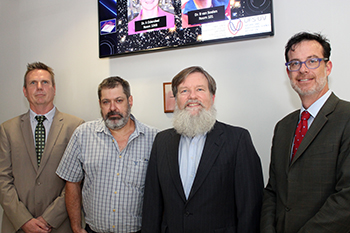Latest News Archive
Please select Category, Year, and then Month to display items
17 August 2020
|
Story Nitha Ramnath
|
Photo istock

Within the next five years, 60% of the world’s population will be living in urban areas. Urban living comes with large-scale economic advantages and society benefits from economies of scale. But, COVID-19 is challenging urban living. We have introduced the term ‘social distancing’ and some policy analysts have even argued for the de-densification of cities.
Join us for a discussion where our panellists will analyse this perceived conflict.
Date: Thursday, 27 August 2020
Time: 14:00 to 15:30 (South African Standard Time – GMT +2)
Please RSVP to Elelwani Mmbadi at
mmbadiE@ufs.ac.za no later than 25 August, upon which you will receive a Skype for Business meeting invite and link to access the webinar.
Speakers:
Prof Ivan Turok
Dr Geci Karuri-Sebina
Mr Thiresh Govender
Moderator:
Lochner Marais
NASA Deep Space Navigation engineer presents at Naval Hill Planetarium
2017-03-30

From the left: Chris du Plessis; US Consulate, Johannesburg,
Prof Petrus Meintjes; Dept of Physics UFS, Christopher Jacobs;
NASA, and Anthony Deaton; US Consulate Johannesburg.
Photo: Rulanzen Martin
The University of the Free State (UFS) hosted NASA Deep Space engineer Christopher Jacobs on 27 March 2017 at the Bloemfontein Campus. The engagement was hosted by Prof Matie Hoffman of the Department of Physics and the Department of Institutional Advancement, in collaboration with the US Consulate General in Johannesburg.
Jacobs is stationed at NASA’s Jet Propulsion Laboratory (JPL) at the California Institute of Technology and has served as the Reference Frame Calibration task manager for 25 years. In this role he has been responsible for delivering the reference frames used to navigate NASA missions such as the Mars Science Laboratory to planetary targets.
His visit to the UFS included a presentation to the Department of Astrophysics at the Faculty of Natural and Agricultural Sciences and at the Naval Hill Planetarium in Bloemfontein where he spoke on Stellar GPS: Navigating the Solar System. He also spoke about the latest research and developments at NASA in Astrometry. The visit will establish and develop shared interests and possible collaboration with UFS and other institutions of interest in the country. “South Africa, because of its well-placed geographic location in the southern hemisphere, holds a lot of answers to astronomy,” Jacobs said.
He has an active interest in professional and public education, and outreach, having given public lectures around the world. “Astronomy brings people together and is a point of common interest that is key in solving environmental and geographical challenges such as climate change, therefore global cooperation is important,” he said.
Prof Hoffman welcomed the initiative by the US Consulate and the possible outcomes of joint efforts to position the UFS as a key partner in South Africa on NASA’s astronomy projects. In the coming weeks Jacobs will speak at high schools in Gauteng including the Mae Jemison US Science Reading Room in Mamelodi, Pretoria, a centre that is focused on promoting science education.